Tattoo artist Kitty Love came to Asheville with then-partner Eric Poland in the early 1990s, arriving by bus — a school bus. But this was no standard yellow coach, she recalls: “It had a dead astronaut on one side and a big comet on the other.” After cruising down Lexington Avenue, she continues, “We looked at each other and were like, ‘Well, there is a requisite number of weirdos in this town; we could probably make a living here as tattooists.’”
Love is only one of many individuals, businesses and organizations that have helped foster and nourish downtown Asheville’s trademark eccentricity. Besides owning Sky People Tattoo on Lexington Avenue, she co-founded the Lexington Avenue Arts and Fun Festival in 2001 and served as executive director of the Asheville Area Arts Council from 2011-16.
But as the city’s ever-increasing popularity has piqued the interest of big hotel chains and other corporate enterprises, it’s also triggered fears of homogenization and loss of essential character, raising the question: Can Asheville stay weird?
Just a couple of souls hanging out
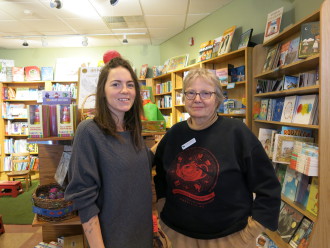
In 1982, Emöke B’Racz opened Malaprop’s Bookstore/Cafe in downtown Asheville. Back then, she remembers, “There was nobody on the street, normal or weird. It was basically just a couple of souls hanging out.” The major chain stores that once lined the avenues had long since fled to the Asheville Mall. Apart from a few independent shops, the central business district was a ghost town.
A handful of individuals, says B’Racz, sowed the seeds of downtown’s current success. Those visionaries included developer Roger McGuire and philanthropist Julian Price (see “Anonymous: The Million Secrets of Julian Price,” May 18, 2016, Xpress), and over time, a new, quirkier downtown began to coalesce.
In 1997, with the help of Price’s development group, Public Interest Projects, Malaprop’s relocated to its current location on the corner of Haywood and Walnut streets. And in 2000, Publishers Weekly named the store its Bookseller of the Year. The award, notes B’Racz, put Malaprop’s on the map. “Everyone started looking at us, saying, ‘A store like this exists in a little town like Asheville?’”
The gradual transformation of an urban wasteland, she points out, has completed a trifecta for the tourism industry, with today’s thriving city center complementing the mountains and Biltmore Estate as major draws.
Memorable experiences and unscripted moments
This triple threat of tourism has garnered many accolades and attracted ever more national attention. In 2017, U.S. News & World Report ranked Asheville No. 3 on its list of Best Small Towns to Visit in the USA. Meanwhile, print publications such as Travel + Leisure, Harper’s Bazaar and Esquire have also sung the city’s praises.
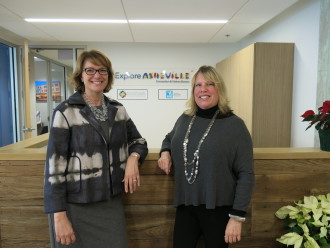
Stephanie Pace Brown, president and CEO of the Explore Asheville Convention & Visitors Bureau, gives some of the credit to Marla Tambellini, the nonprofit’s deputy director and vice president of marketing. “I kind of have this mental image of Marla making this snowball 20 years ago,” says Brown. “She’s been rolling it and rolling it, and now everyone thinks, ‘Oh my God, it’s magical that we get all this national press!’”
Tambellini and her team, stresses Brown, have been working for two decades to promote the area. Explore Asheville, an offshoot of the Buncombe County Tourism Development Authority, currently advertises in 15 markets in seven states.
“In our research, we try and understand what makes Asheville a desirable destination,” Tambellini explains. For the most part, she says, people want memorable experiences and unscripted moments. Tambellini believes Asheville’s independent businesses, as well as the city’s buskers, drum circle and LaZoom Tours, create “a completely different experience from other downtowns. That’s what travelers are craving.”
Recent numbers document the city’s growing popularity. According to the Tourism Development Authority’s 2017 annual report, taxable lodging sales jumped from $162.6 million in 2007 to nearly $352 million this year. In the same period, the total number of hotel rooms sold increased from 1.47 million to 1.9 million. Brown points out that the increased revenue is a function of both the rate hotels can charge for their rooms as well as the volume of visitors to Asheville.
Storytelling, says Tambellini, has become a key component of her nonprofit’s marketing approach. “We don’t want to Disney-fy the city,” she explains. “We really want to share what we’re about as a destination.”
Using hotel tax revenues to build Asheville’s profile has brought benefits to local small business owners, Brown says. “Our downtown has not had to depend on national retailers that have their own big marketing budgets to attract people to their stores,” she points out. “Folks have been sustainable over a long period of time because of the customer base that everybody gets to share.”
Becoming another Nashville?
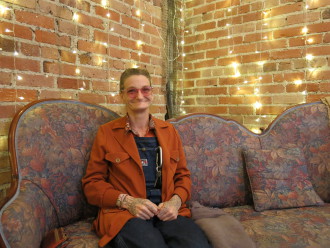
Not everyone is sanguine about the city’s recent boom, however. Before moving to Asheville in 2012, Abby Roach called Nashville home. But over the last decade, says the busker, who’s better known as Abby the Spoon Lady, her former stomping ground has changed dramatically, its once quaint feel giving way to an overcrowded and incredibly loud downtown. And now, Roach fears Asheville may be headed in a similar direction.
The crowds her act attracts, she notes, “are getting bigger every year. And at the end of this season, we had two new hotels open. So what do you think is going to happen in the spring when those hotels are in full bloom? The crowds are going to be even bigger.”
Even now, Roach maintains, this situation presents more challenges than rewards. Tourists stopping to enjoy buskers’ offerings wind up blocking sidewalks and often spill out into the street, creating safety hazards. This past Thanksgiving, a police officer approached Roach and bandmate Chris Rodrigues, she says, asking them to keep an eye on the size of their audience. The request reinforced Roach’s ongoing suspicion that time may be running out for local buskers.
“The moment the police start stopping performers because their crowds are too big, that’s it,” she asserts. “I have a fear next year is that year for Chris and I.”
Hand in hand
The city has been a key player in downtown revitalization efforts for decades, however, and Roach’s concerns haven’t fallen on deaf ears. Since 2014, city officials have collaborated with the Asheville Buskers Collective in seeking ways to address these issues. They’ve launched a number of pilot programs, including temporary closures of Wall Street to vehicles.
Dana Frankel, the city’s downtown development specialist, believes those programs are a step in the right direction. She says the city understands and appreciates the importance of all of downtown’s unique attributes — from the busking community to local businesses to street markets.
Collaboration, she states, is the key to keeping Asheville weird. “It shouldn’t be the city that is running these programs and getting in the way of a lot of these creative or weird or artistic activities,” she argues. “When we can work together to support one another and address some of the concerns that are in the community through further conversation and collaboration, it’s really a win.”
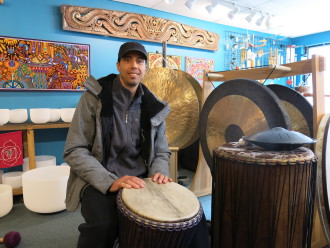
The owners of some long-standing, independent downtown businesses, however, believe the influx of hotels and chains will continue to drive up rents. Billy Zanski, who owns Skinny Beats Sound Shop on Eagle Street, worries that mom and pop stores like his will inevitably be squeezed out by still more restaurants, bars and high-end boutiques. “What will happen is my business and others will need to move to Leicester Highway or wherever else the rents are not so much,” he predicts.
But even as the city tries to find ways to keep buskers on the streets, notes Frankel, it’s also making efforts to keep local businesses like Zanski’s downtown. “The city has explored tools, and there are things we can do and there are things we are doing, such as supporting organizations that do help businesses get financing and be successful and develop business plans,” she explains.
Those collaborations include partnering with the Economic Development Coalition, the Carolina Small Business Development Fund, the Asheville Area Arts Council, the Eagle Market Streets Development Corp., Mountain BizWorks, the WNC New Economy Coalition, Green Opportunities, OnTrack Financial Education & Counseling and the Mountain Community Capital Fund. The last entity, a joint city/county initiative that’s due to launch next year, aims to increase local, minority-owned businesses’ access to capital.
And though the city can’t legally interfere with private leases, Frankel concedes, “That doesn’t mean there aren’t things we can do to support these businesses and help them thrive.”
If you think this is weird …
Over at Malaprop’s, B’Racz takes a somewhat contrarian view. The way she sees it, a truly weird downtown would be one whose streets were lined with chains: “Weird, but in a very bad way.” The only solution, she believes, is to vote — not only in elections, but also with your money. Locals supporting locals “has to be practiced properly by every single person to make a difference.”
Franzi Charen, who founded the Asheville Grown Business Alliance and co-owns Hip Replacements Clothing on Lexington, agrees. She sees chains, absentee owners and an influx of out-of-town developers as major concerns and believes resolving them will take a concerted effort. Among the most important factors, she believes, is community support.
“I’ve seen far less locals coming downtown,” Charen points out, adding that without such support, local ownership and economic self-reliance will falter. Tourist dollars, she maintains, are not enough: Grassroots efforts such as her organization’s Go Local campaign are crucial to keeping downtown the thriving, unique community it is today.
Rob Sebrell, who owns Push Skate Shop on Patton Avenue, also implores residents to return to the city center. “Over the years, the No. 1 thing you hear from most people who live in Asheville is, ‘We don’t come downtown anymore.’” That mindset, says Sebrell, will spell the area’s demise. “We need [the locals] back here if we want to keep the place what it is,” he declares. “You can’t just run away when the tourists arrive.”
One-finger salutes
In a way, LaZoom Tours epitomizes the tourism conundrum. At the start of each excursion, says Kelly Morgan, media manager for the zany indie business, the tour guide tells passengers, “Look out for people waving at you. They’re going to be locals — and sometimes they won’t be using all of their fingers.”
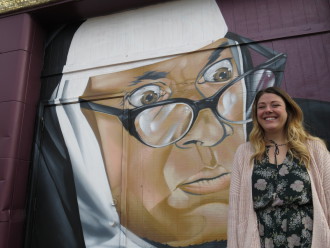
Many downtown business owners cite LaZoom as a defining feature of what makes center city weird. Indeed, the increasing popularity of its offerings has led to the creation of two new ones: the Band & Beer and Kids’ Comedy tours. The former, notes Morgan, highlights a shift in the type of visitor now coming to Asheville. “People used to be really obsessed with the drum circle,” she says. “Now it’s like, ‘Where’s the brewery?’”
Still, Morgan says she understands the reason for the one-finger salutes offered by some in the community. “We’re a rolling billboard that represents a lot of things. So if you’re angry about tourism and then you see the big purple bus go by — you know … ” she says, giving the salute.
At the same time, Morgan believes that most of those harboring negative feelings toward LaZoom have probably never taken a tour. “I have service industry friends that might have opinions about it being cheesy or touristy, and I’m like, ‘Ride with me,’” she says. “And they have a blast.”
Both sides now
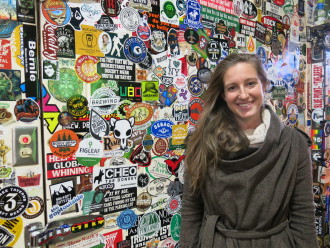
Other downtown businesses take a broader approach, seeking to appease all parties. “To some extent, we have to bend to the tourists,” acknowledges Elizabeth Keil, Green Man Brewery’s marketing manager. “But we have the Mansion [the brewery’s posh outpost on Buxton Avenue], which is a very refined version, and then we also have Dirty Jack’s, which is very unrefined.”
Some folks, notes the Asheville native, “are really looking for the refined version. But then there are still people who are looking for that very authentic version of what Asheville is: a place where you are unapologetically yourself. I think Dirty Jack’s does a good job of representing that.”
For Keil, the enthusiasm of local businesses’ owners and staff is key to keeping Asheville weird. That passion, she maintains, helps elevate the type of visitors the city attracts. “The more you’re willing to do something because you care about it, the more people say, ‘That’s cool. Tell me more about it,’” she says. Because of this, continues Keil, “I think Asheville will maintain its individuality.”
Chain, chain, chains
In 2000, Scott Sirkin was in the midst of transforming the 19,000-square-foot former F.W. Woolworth Building into its current avatar as a showcase for local artists (see “The Making of Asheville’s Woolworth Walk,” Sept. 26, 2014, Xpress). Back then, says Sirkin, “When you mentioned Asheville, you almost always got the answer, ‘Where?’”
Anonymity is relative: 2000 is also the year that Rolling Stone dubbed Asheville “America’s new freak capital,” while the AARP named it the nation’s No. 1 small town to retire to. But clearly, Asheville has continued to gain prominence since then, and these days, Sirkin sees Asheville’s downtown becoming ever more corporate.
“We’re not going to fight off the big chains forever,” he argues. But that doesn’t have to mean the end of the mom and pop shops. Instead, Sirkin says he envisions Asheville going the way of Charleston, S.C.: a mix of high-end retail, local galleries and shops.
For her part, Charen doesn’t dismiss Sirkin’s prediction. “It’s not out of the question that that can happen,” she concedes. “It absolutely can. But I’m going to work my butt off to make it not happen, because I do love this community.”
Dodging the gawkers
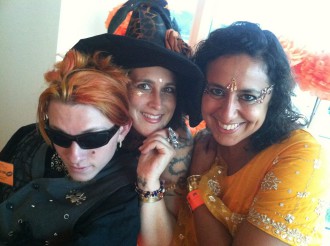
And while the city may not look as weird as it did when Kitty Love first cruised down Lexington in her tricked-out school bus, she believes that Asheville’s weirdness is intact: You just have to dig a little deeper.
“Alternative happenings have scuttled underground even further of late, in order to avoid the infiltration of those who’ve been invited to gawk,” she pointed out in an email. “There are very ‘weird’ and unusual things happening here in all aspects of what are the usual fringe areas: the arts/art-making, spirituality/witchcraft, alternative living practices, political movements, gender-bending/bias challenging, drug culture, sex, music and more, even within the seemingly public forum of independent business. It’s just what we see is the more ready-for-prime-time version, whereas the deeper stuff happens in private.”
Still, if Ashevilleans truly want to keep their city weird, she believes the underground scene must take its efforts to the next level. “I don’t think it’s enough for Asheville’s weirdos to simply entertain themselves any longer. The environment demands something greater of us, and it’s my hope that all eyes on Asheville might capture something truly different, if we can hold ourselves to an even deeper form of authenticity.”

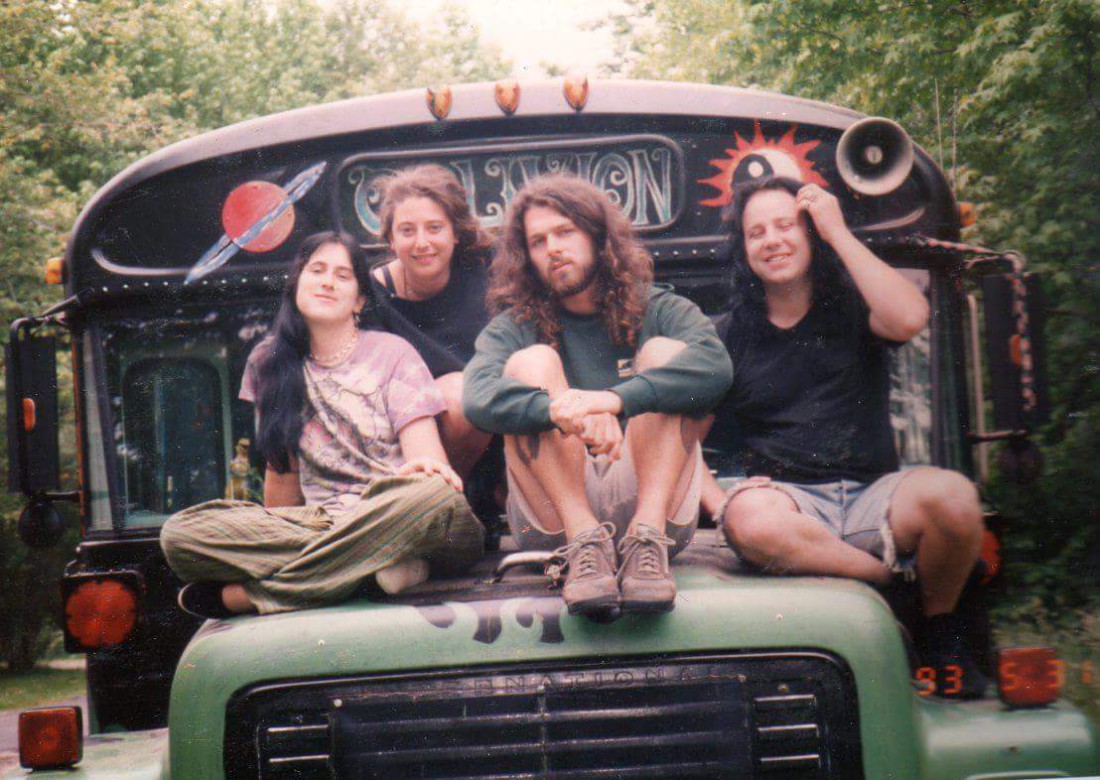


LOL, how can you ever showcase the town when your greedy crony council and it’s whole hosts of conflicts of interests are never allowed to surface? Because underneath it all are a minority of people who control everything and are making damn sure no one else can earn a living unless they fit in with the mold.
Asheville ain’t weird. It’s snobby, one sided, authoritarian, crony controlled, and filled with the most moronic and least creative people around. Literally when one looks around downtown, it’s the same rehashed crap block after block. Bar, art, clothing store, furniture store, hotel. Then again, the area is not a place that caters to locals or even welcomes them. Unless they live in a gated community.
Nice! Asheville is the common kind of weird…a contrivance to generate $$$$$. Trump antics come to mind.
Name one city you actually like.
Naw…that’s my secret.
Lulz- are you sure it is Asheville yiu are talking about?
LOL, how can you ever showcase the town when your greedy crony council and it’s whole hosts of conflicts of interests are never allowed to surface? Because underneath it all are a minority of people who control everything and are making damn sure no one else can earn a living unless they fit in with the mold.
Asheville ain’t weird. It’s snobby, one sided, authoritarian, crony controlled, and filled with the most moronic and least creative people around. Literally when one looks around downtown, it’s the same rehashed overpriced crap block after block. Bar, art, clothing store, furniture store, hotel. Rinse and repeat.
The title of this article should be: When is Enough Enough. How far can Explore Asheville and the TDA push tourism, now based on breweries and the old myth of Keeping Asheville Weird? Money from hotel room taxes, flowing endlessly through Explore Asheville, can buy unlimited Best Of tourism promotions. Is there an actual goal in mind? Or, is it simply bring as many tourists as possible and have a hotel on every corner. Local small downtown businesses want it both ways, more tourists and more locals. Locals should come when tourism drops off in the the winter? In order for locals to return to downtown, we have to have a sense of being valued, at least as much as tourists. The incentive can begin with designated parking for City residents.
“Is there an actual goal in mind?”
Heads in beds. It’s a bit like the intelligent paperclip maximizer: https://wiki.lesswrong.com/wiki/Paperclip_maximizer
For all of Explore Asheville’s success in packaging the city and surrounding area to visitors, it has consistently failed in its marketing to locals. (Marketing is more than just advertising: it’s about defining a space within the “product” where locals are more than just set-dressing.) That was never inevitable.
” In order for locals to return to downtown, we have to have a sense of being valued, at least as much as tourists. ”
I’d settle be being valued half as much as the tourists.
“Now is that a real poncho, or is that a Sears poncho?”
The answer is no. Once various shortsighted people chose to wrestle Asheville to the ground and squeeze the precious weird juice out of it for profit, that doomed any genuine weirdness.
Weird is dead. Welcome to Weird™
Downtown Asheville never really has been all that weird.
That’s true. It’s only “weird” by WNC standards. But then there’s parts of WNC that still haven’t heard of ‘New Coke’, and think that the ‘internet’ is that webbing you string between trees to catch flying squirrels for supper.
Love it!
Lest anyone wonder how and why politicians like Mark Meadows, Chuck Edwards, or Trump get elected, just take note of the snide condescension frequently exhibited in these pages.
“just take note of the snide condescension–”
Oh, bless. Spend any time among people from broader WNC and they’ll gladly volunteer their opinions on Asheville. “Cesspool of sin” was mild by comparison, and if I were to repeat verbatim the descriptions I’ve heard they wouldn’t get past the moderators.
Lest anyone wonder how and why politicians like Mark Meadows, Chuck Edwards, or Trump get elected, just take note of the snide condescension frequently exhibited in these pages.
Yes, before snide online comments were invented, people in this country made only sane, sober electoral choices. My bad.
I moved to the area in the ’90s and remember a very different Asheville. I was fleeing South Beach and its swift shift from low-rent, Art Deco Boho paradise to a tacky tourist town. At the time, downtown was pretty dead. I often wondered where all of the people were on weekends. There was no beer scene, a small music scene, and a very D.I.Y vibe. At that time there was a much more visible and sizable lesbian population, more new age-y hippy types, more of a bohemian culture in general. Just like how my former home went from a laid-back, artsy and inexpensive place, it has been completely transformed into a tourist money machine. The quirks and character of this city have been co-opted, marketed and turned into a caricature of itself. Still, the city is vibrant and alive, and many seem happy with the new Asheville. It’s just not the same place, but that seems inevitable. It’s a shame that those marketing the city continually hype it, and offer a watered down version that is palatable to the upscale tourists that can afford hotel rooms in the hundreds of dollars.
One thing I will add to this, and it’s about the shop local trend, which is awesome. The only thing that is flawed in this, is that it excludes using local talent for creative services. Every time I spend a dollar at a local business, I first check out their website. If it’s a local designer that did it, I’ll give them my business. If it’s some generic, build it yourself site, I go elsewhere. There is a huge creative community in Asheville, many of which keep the city “weird”, but struggle to survive. Sending your money to WiX or SquareSpace doesn’t help that community thrive. Please support local creatives!
The only thing weird about downtown Asheville is how “white” it is. There is virtually no diversity in this town regardless of what people wan t to believe. Nothing “weird” about Asheville.
Maybe that’s what local residents need to do: mount an aggressive “Asheville Really Isn’t That Weird” campaign. And then, when the tourists dry up, and all these new hotels go out of business, we can convert them to apartments. That’s how we got the Vanderbilt.
https://www.asheville.com/news/vanderbilt.html
There is LOTS of diversity downtown! There are white people WITH dreadlocks and white people WITHOUT dreadlocks!
Can downtown Asheville survive the onslaught of gawking tourists and the coming of the well off and restless? (not to mention the hipster cocktail rave lol ….highly unlikely)
I am from a very small Southern town South of Birmingham Al. I never thought about or had any desire to come to Asheville until I saw a video of Abby “The Spoon Lady” & Chris Rodrigues. I started following her and listening to her rave about how much she loves this place, her home now, I started looking at all the pictures of your town. There is so much beauty there and I can only hope that I get to see it in person and get to experience the Buskers downtown before they are pushed out!
It’s funny, there’s this idea that Asheville is weird, like it’s something unique to the place. I grew up in Ithaca, NY and then Oneonta, NY. They were super weird. And? Weirdness is all across America, so spare us this BS. That’s one thing I HATE about Asheville, like your “weirdness” is so unique. It’s not. Maybe in the South, it is, but I have always wondered what the big freaking deal is about this town. The shiny happy people are gone, now it’s just people that got sold on how great it is. Gross.
Could someone tell me where Malaprops was before they moved to their current location?
59 Haywood St, where Sensibilities Day Spa is now. Just a couple of doors down from the library.